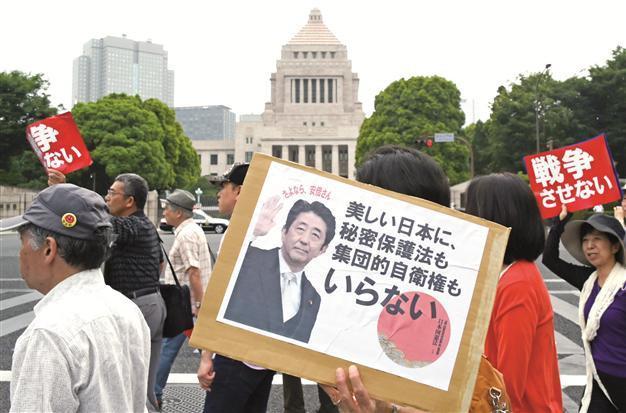Japan PM Abe’s support lowest since 2012 amid doubts about security bills

Protesters hold banners which translate as “No need Special Secrecy Law nor right of collective self-defense in beautiful Japan” and “Good-bye Abe-san” as they attend a rally against a security bill outside the Diet building in Tokyo on June 14, 2015. Almost 25,000 protesters gathered around the Diet building to oppose a controversial bill for Japan’s growing security engagement. AFP Photo
Support for Japanese Prime Minister Shinzo Abe’s cabinet has fallen to the lowest level since he took office in 2012, to just over 40 percent, with nearly two-thirds of voters opposed to his muscular defense policy that would end a self-imposed ban on the military fighting overseas, a weekend media survey showed.
The survey by Nippon Television Network coincided with weekend rallies by thousands protesting the legislation, which would allow Japan to exercise its right of collective self-defence, or militarily aiding a friendly country under attack.
Abe’s cabinet adopted a resolution last July reinterpreting the pacifist constitution to allow the dramatic shift in security policy. In April, Abe told the U.S. Congress that the changes, already reflected in new U.S.-Japan defense cooperation guidelines, would be enacted this summer.
But the outlook for passage in the current session of parliament, set to end next week but which may be extended until early August, has been clouded by growing criticism that the legislation violates the pacifist constitution, drafted by U.S. officials after World War Two.
“I think the government should retract the bills because the core element of the bills - the use of the right of collective self-defense - is manifestly unconstitutional,” Yasuo Hasebe, a constitutional law professor at Waseda University, told a news conference.
Hasebe’s remark to the same effect at a parliamentary panel earlier this month shocked his ruling party hosts and reignited debate about the bill’s constitutionality.
Abe’s support slipped to 41.1 percent from 43.5 percent in the Nippon Television survey, which also showed 62.5 percent were opposed to the exercise of collective self-defence and 63.7 percent were against the enactment of the legislation in the current session of parliament. Almost 80 percent felt the government has not explained the legislation sufficiently.
Thousands rallied on the weekend to protest the security bills and other policies such as plans to restart nuclear reactors taken off-line after the March 2011 Fukushima nuclear disaster.
Organizers said 25,000 attended a rally near parliament on June 14, while more than 10,000 turned out the day before. “I think the majority of the citizens are raising voices of anger towards Abe’s move to destroy the constitution,” said Akira Matsudaira, 73, who played a trumpet at the protest on June 13.
